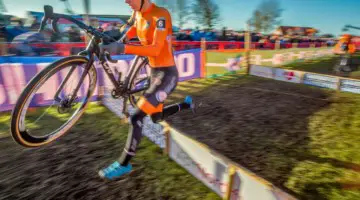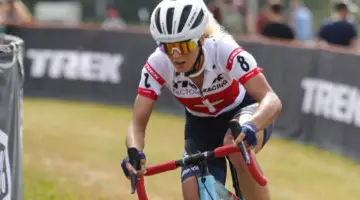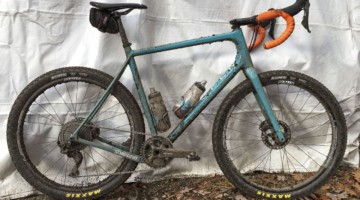Geoff Kabush has never been a cyclist to go with the crowd, and last year at the annual Iceman Cometh Challenge mountain bike race in Michigan, he won on a drop-bar gravel bike. With Kabush returning with his Open gravel bike, we preview the annual point-to-point race.
This Saturday, the 30th edition of the Bell’s Iceman Cometh Challenge will commence in Kalkaska, Michigan. The point to point race will finish after a 30-mile jaunt on mixed terrain in Traverse City.
“We’ve put a lot of work into the course this year,” race director Cody Sovis told Cyclocross Magazine. “We’ve tagged in our local trails association, Northern Michigan Mountain Bike Association, to make some really cool reroutes that up the fun factor, but also make the course a lot more sustainable for years to come.”
The race will feature a combination of doubletrack and singletrack, which will be marked by the region’s sand-based soil. “There are definitely some soggy spots, Sovis said of the course. “We have lots of sandy soil, but some parts will see slick black dirt.”
While there are plenty of choke points and places for a race to be lost, Sovis believes the course changes will have an effect on how the race unfolds. “The decisive spot for the pros, in my opinion anyway, is that new Headwaters section,” he told us. “With its addition, 25% of the race’s elevation comes in the final 4 miles.”
Gravel, But for Mountain Bike Racing?
Traditionally, the Iceman Cometh Challenge has been a mountain bike race. But with most of the 30 miles taking place on doubletrack and dirt roads, it has much in common with the courses common in gravel racing.
This concept was proven last year when Geoff Kabush won the race on an Open U.P.P.E.R., albeit with 650b x 2.1” Maxxis Aspen tires.
“Kabush won on drop bars last year, and I think you’re going to see a ton of people try it this year,” Sovis said. “I’ve actually done it on a cyclocross bike twice. Some years it’s totally the way to go. It all comes down to the sandpits. The course for this year has more sand than in 2018, but it’s really, really fast too. I think Kabush’s 650b set-up is ideal.”
To learn more about how a drop bar bike could work in a mountain bike race, we went straight to the source and asked Kabush about his setup.
“I chose to use my OPEN last year at Iceman mostly because it sounded like a fun challenge,” Kabush said. “I actually ride my OPEN off-road quite a bit so I’m really comfortable on it and I’m always looking for somewhere I can get an advantage. The main reason it worked was because the OPEN U.P.P.E.R. I used last year can take 27.5” mountain bike tires. I ran 2.1” Maxxis Aspen tires which gave all the grip I needed. My bike last year had my cyclocross gearing on it, 46/34t crank with an 11-30t cassette and that gearing was no problem. I actually just kept it in my 46t as all the hills are quite short and punchy.”
While Kabush was pleased with his setup, he saw room for improvement this year.
“I will be racing drop bars again but on an even more dialed-in setup,” he said. “I have the new OPEN WI.DE. with the new 1x GRX 42t chain ring and 11-40t cassette. I’ll run the same tires but the new GRX hoods give a ton more confidence and control riding in the hoods. I don’t need bigger tires but there is more clearance on the WI.DE. too so I’ll be set if it gets muddy.”
While racing a gravel bike in a mountain bike race is fine for a pro with a background in both cyclocross and trials riding, we wondered how more middle of the (dirt) road riders would fare. According to Kabush, just fine.
“I think the higher volume tire helps a lot for traction on the loose climbs but there wasn’t anything super technical in past years. I feel like anyone who’s ridden some technical cyclocross will have no problem riding the course. Racing gets a bit more hectic but besides a few braking bumps in some singletrack you just have to pick your moments where to go fast.”
The 30th edition of the Iceman Cometh Challenge kicks off on Friday, November 1 with the Iceman Expo at the Grand Traverse Resort and Spa. Racing kicks off the following day at 9:00 a.m., with Pro/Cat1 fields departing at 2:30 p.m.



























